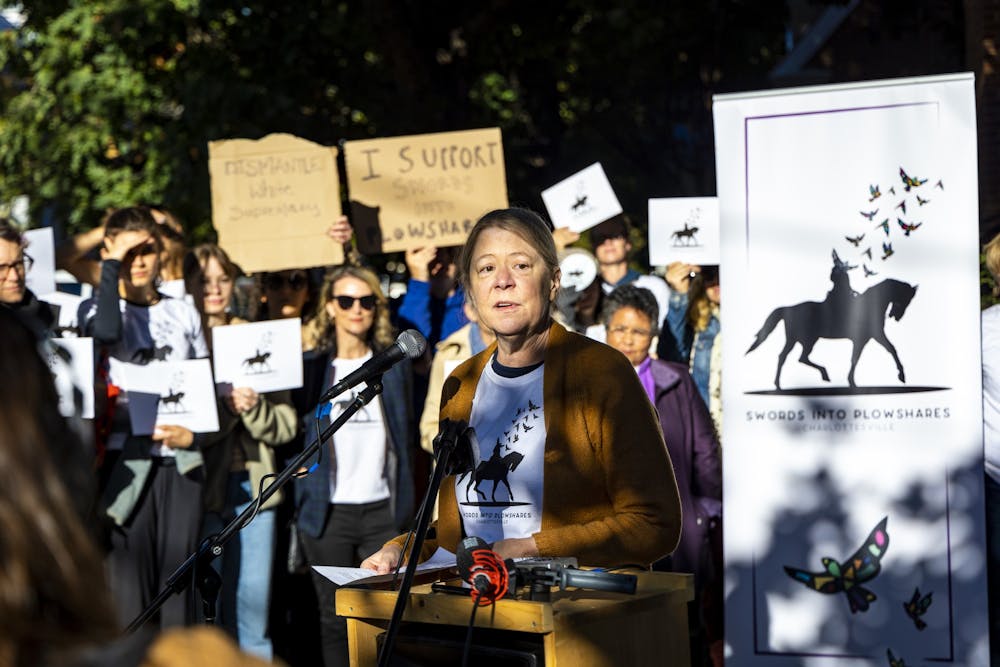The hearing of the Trevilian Station Battlefield Foundation and the Ratcliffe Foundation v. the City of Charlottesville and the Jefferson School African American Center lawsuit began Monday. The Charlottesville Circuit Court denied requests for an early appeal and a summary judgment.
The plaintiffs — the Trevilian Station Battlefield Foundation and the Ratcliffe Foundation — are arguing that the City lacks the right to destroy Confederate monuments under state law. Code §15.2-1812 allocates the ability to “remove, relocate, contextualize or cover” memorials and monuments of war veterans.
The City argues that because it transferred legal ownership of the Lee statue to JSAAHC to repurpose, it can no longer be considered a public monument.
The City removed the Lee statue from Emancipation Park July 9, 2021. Throughout the summer of 2017, the Lee statue and the Thomas “Stonewall” Jackson statue were the center of much controversy and legal battles. This culminated in the events of Aug. 11 and 12, 2017, when torch-wielding white supremacists marched down the Lawn and the “Unite the Right” rally the next day turned deadly.
City Council voted unanimously in December 2021 to donate the statue to JSAAHC so it could be melted down and repurposed into public art.
The City also requested a protective order limiting who is allowed to view the Lee statue, citing the 2017 “Unite the Right” rally to demonstrate the potential risks of alerting the public of the statue’s location. The protective order was granted by the court, and the Lee statue’s current location and condition remains undisclosed to the public.
JSAAC continues to play a key role in the lawsuit as both a defendant and the party in possession of the Lee statue. Advocates from JSAAHC and Swords Into Plowshares — the formal project in charge of repurposing the Lee statue — held a press conference in front of the Charlottesville Circuit Courthouse prior to the court session to discuss the project and the court case.
Kristin Szakos, Swords Into Plowshares community ambassador, stressed that this case affects the wider community.
“Today, the eyes of the world are on our city,” Szakos said. “Today we have a chance to show the world what a thoughtful, community-centered process can do to transform such an object of division and violence into new art that is healing and beautiful.”
During the press conference, JSAAHC Board Chair Leah Puryear said it is important to continue with plans to melt down the statue in order to promote cultural growth.
“It is our desire to move harmful history into a place of healing,” Puryear said. “We are backed by the City of Charlottesville and our aim is to participate in the development of a city that lives up to the values that they espouse.”
The Lee statue was first built in 1924, while the Stonewall Jackson statue was built in 1921. This construction was bankrolled by Paul Goodloe McIntire, the namesake of the University’s McIntire School of Commerce, McIntire Amphitheatre and McIntire Department of Art. McIntire also purchased Lee Park — which was renamed to Market Street Park in 2018 — and Jackson Park — which was renamed Court Square Park — to house the statues.
JSAAHC’s legal counsel Christopher Tate said the defense remains “very confident” in its legal position.
JSAAHC Executive Director Dr. Andrea Douglas also said she is hopeful the Swords into Plowshares initiative will prevail.
“Charlottesville made a decision about what it wants to do with its statues, and we are willing to go through every single one of those processes to make sure that that is the outcome that is required,” Douglas said after the hearing.
As of press time, the plaintiffs have not responded to a request for comment. The Monument Fund has issued support for both plaintiffs. The group is a nonprofit that successfully won a 2017 lawsuit against the City that delayed the Lee statue’s removal using the same attorneys working on the current case.
The case will continue as scheduled at the circuit level in February 2023.







